Overview
Have you ever wondered how manufacturers can stay ahead in today’s fast-paced market? Well, eCommerce ERP integration might just be the answer! This article dives into ten fantastic benefits of this integration, showing how it streamlines operations, cuts costs, and boosts customer satisfaction.
For example, when manufacturers integrate their systems, they often see improved efficiency and fewer human errors. Imagine making decisions based on real-time data instead of guessing! This not only enhances decision-making but also helps manufacturers maintain a competitive edge.
So, why not take a closer look at how these benefits can work for you? By embracing eCommerce ERP integration, you could transform your operations and keep your customers happy. Let’s explore these advantages together and see how they can make a real difference in your business!
Introduction
Have you noticed how quickly eCommerce is changing the game for manufacturers? It’s transforming the whole landscape, creating a pressing need for manufacturers to connect their eCommerce platforms with ERP systems. This integration isn’t just a nice-to-have; it’s a game changer that can streamline operations and open up a world of benefits. Think about it: from slashing operational costs to boosting customer satisfaction, the advantages are huge!
But here’s the catch: while the potential for efficiency is exciting, navigating the complexities of integration can feel daunting. So, how can manufacturers tap into the power of eCommerce ERP integration to fuel growth and stay ahead in this digital age? Let’s dive in and explore how you can make this work for you!
GenAlpha Technologies: Streamline Operations with eCommerce ERP Integration
At GenAlpha Technologies, we’re all about delivering customized e commerce erp integration solutions that seamlessly fit with ERP systems. Take our flagship product, Equip360, for example. This innovative platform helps producers streamline their operations, optimize inventory control, and boost overall sales performance. By automating processes and cutting down on manual errors, Equip360 makes sure that every department has access to real-time data. And let’s be honest, having that information at your fingertips is crucial for improving operational efficiency.
So, what does this mean for producers? Well, it means they can respond quickly to market needs, enhance client satisfaction, and maintain a competitive edge in their industry. Industry leaders are on the same page, emphasizing that the successful e commerce erp integration of eCommerce and ERP systems is key to achieving operational excellence. As Lisa Schwarz, Senior Director of Global Product Marketing, puts it, "71% of businesses believe that decisions are delayed if ERP data is unavailable." This really highlights how important it is to to boost efficiency.
Equip360 not only facilitates this vital connection but also helps producers meet their commitments to clients, ultimately driving growth and profitability. Isn’t it exciting to think about how technology can make such a difference? If you’re looking to enhance your operations, why not explore what Equip360 can do for you?
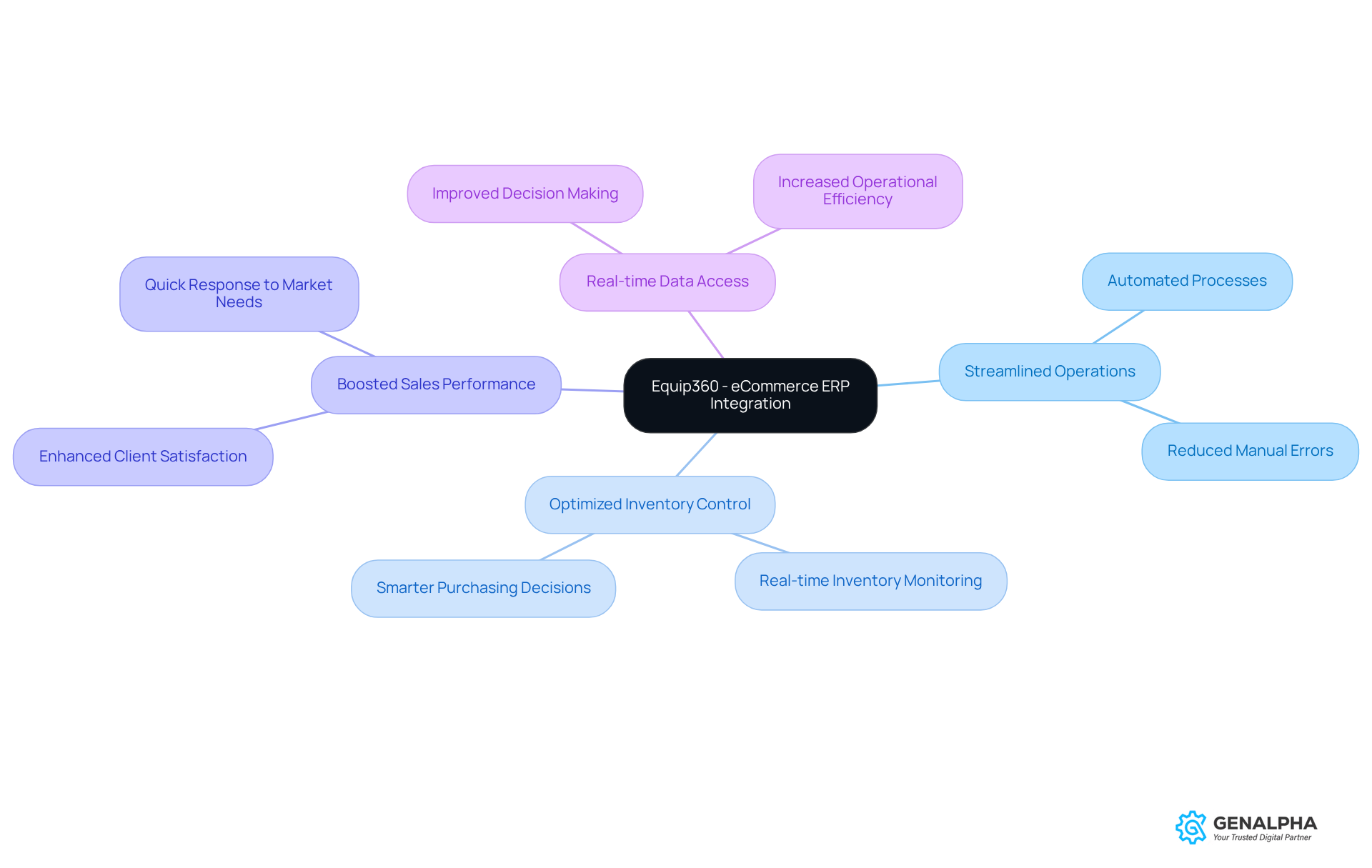
Lower Operating Costs: Achieve Savings Through eCommerce ERP Integration
Have you ever considered how e commerce erp integration could revolutionize your business? It can actually lead to some pretty significant reductions in operating costs! By automating routine tasks and cutting down on manual data entry, you not only save on labor costs but also reduce the chances of making costly mistakes. For example, businesses that adopt automated reconciliation processes can slash their reconciliation time by up to 70%, according to the Panorama ERP Report 2023. This means faster financial operations and .
And there's more! Producers who utilize ERP integration report an average cost decrease of 40% in IT expenses. This is mainly due to streamlined operations and less manual workload, as highlighted in the same report. By optimizing processes, producers can allocate resources more effectively, leading to substantial savings over time.
Financial analysts have found that companies integrating ERP systems often see the expected benefits, with a whopping 76.2% reporting better interactions with suppliers and boosted productivity. But let’s not forget, the e commerce erp integration does come with its own set of challenges, like data migration hiccups and the need for solid change management.
Real-world examples show that producers embracing automation not only cut operational costs but also enhance overall efficiency. This positions them for sustained growth in a competitive market. So, are you ready to explore how ERP integration can transform your operations?
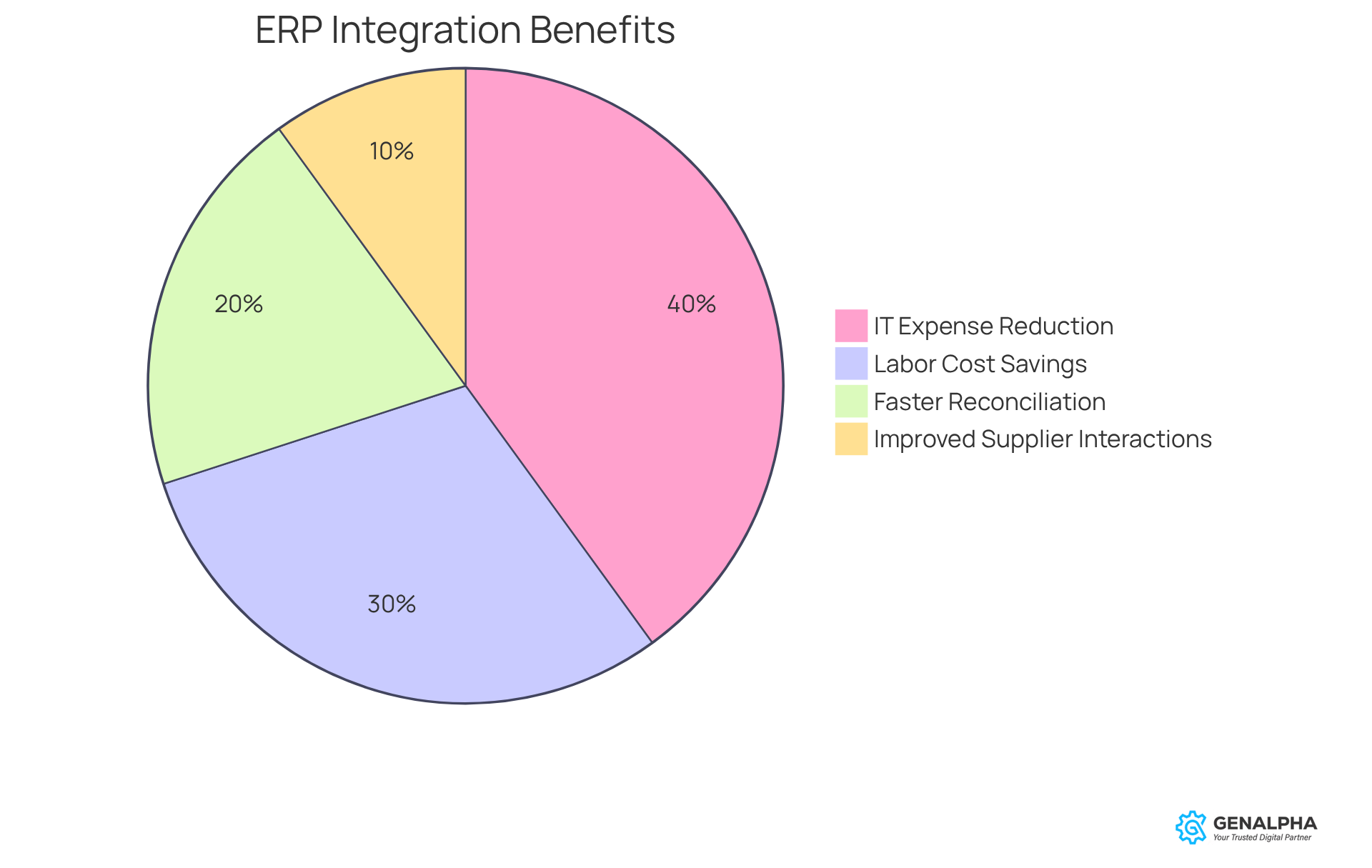
Reduce Human Error: Enhance Accuracy with eCommerce ERP Integration
Have you ever thought about how e commerce erp integration can truly transform the way businesses operate? One of the standout benefits is their ability to drastically cut down on human error. With automation handling data entry and keeping information in sync across platforms, manufacturers can rest easy knowing that order details, inventory levels, and customer information are accurate and up-to-date.
Did you know that businesses using ERP systems see a whopping 35% reduction in cycle time? This improvement directly boosts order accuracy and . For example, advanced reconciliation software can match up to 70% of high-volume transactions in an instant, which means fewer mistakes and smoother operations.
Additionally, e commerce erp integration enhances data accuracy by providing real-time updates—essential for reliable inventory and order management. This means producers can quickly adapt to changes, ensuring they meet customer demands without compromising on quality or efficiency. It's no wonder that 47% of ERP users are in manufacturing, underscoring the importance of ERP integration in this field.
So, how can your business benefit from this technology? It's time to consider how e commerce erp integration could streamline your operations and enhance your bottom line!
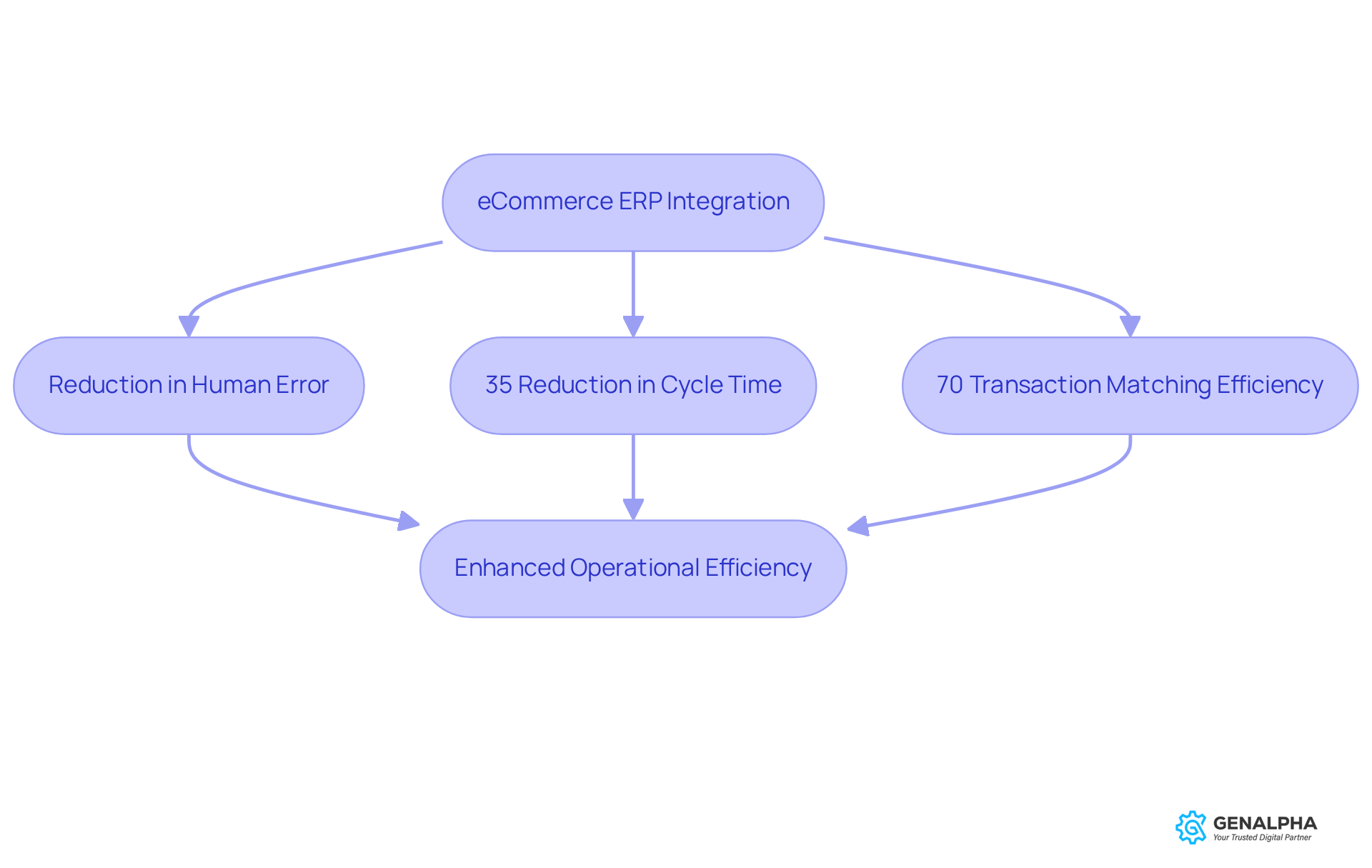
Speed Up Fulfillment Time: Boost Efficiency with eCommerce ERP Integration
Have you ever thought about how e commerce erp integration can significantly enhance fulfillment efficiency? Imagine automating your order processing and inventory management—suddenly, you’re cutting down the time it takes to pick, pack, and ship products. This streamlined approach not only enhances customer satisfaction but also supports e commerce erp integration, enabling you to manage larger order volumes without compromising on service quality.
For example, statistics show that a whopping 91% of companies using ERP systems report optimized inventory levels. This optimization directly leads to faster order processing. Plus, 78% of organizations have seen improved productivity, and 62% have experienced reduced costs thanks to ERP systems. Isn’t that impressive? Case studies even highlight producers achieving up to a 94% on-time delivery rate by better managing their performance metrics.
As logistics experts often say, "The incorporation of automation technologies is crucial in enhancing efficiency advancements." This ultimately turns into a competitive edge. However, let’s be real—challenges like operational disruptions can pop up during ERP implementation. That’s why careful planning and execution are essential. So, are you ready to explore how this could transform your business?
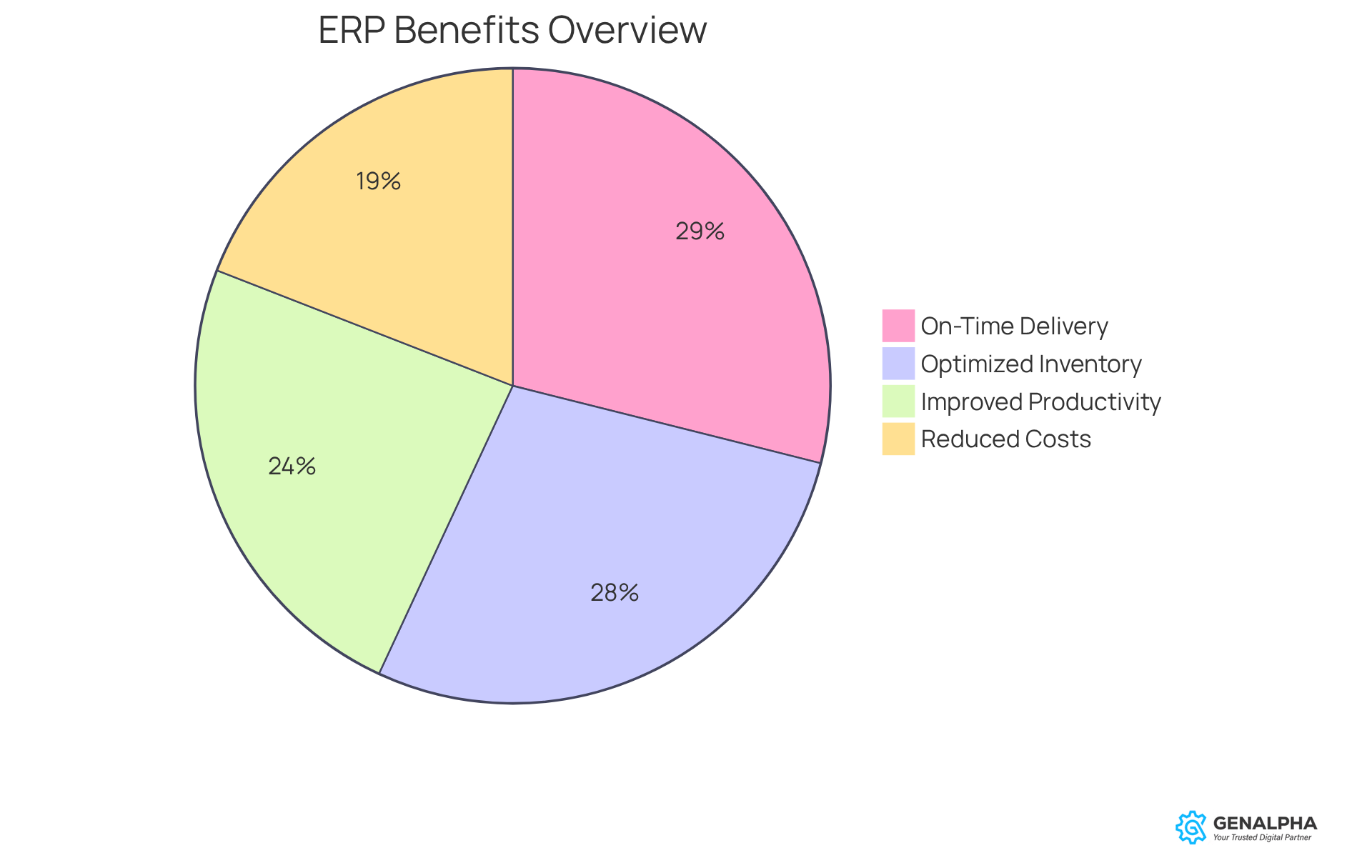
Lower Inventory Costs: Optimize Stock Management with eCommerce ERP Integration
Have you ever considered how e commerce erp integration can truly change the game for producers? It’s all about making inventory management a breeze! Imagine having real-time visibility into stock levels and automating reordering tasks—this means businesses can cut down on excess inventory and keep those carrying costs low. Not only does this boost cash flow, but it also ensures that manufacturers can meet consumer demand without the worry of overstocking.
As industry experts say, "Proactivity is the holy grail of inventory management." Just think about it—having systems in place that alert you to low stock levels can save you from those costly stockouts and really enhance your operational efficiency. And here’s a surprising fact: only 23% of companies have access to real-time data, while a whopping 82% are stuck with outdated information. By leveraging ERP systems, you can gain a competitive edge, making smarter, data-driven decisions that can directly impact your bottom line.
Let’s face it: surplus stock can lead to stagnant cash flow, while not having enough inventory can result in lost sales and unhappy customers. The blend of e commerce erp integration and ERP systems isn’t just a passing trend; it’s a strategic move that can lead to and happier clients. Remember, "Inventory is Money Sitting Around in Another Form"—this really highlights just how crucial effective inventory management is for your finances. So, what are you waiting for? It might be time to rethink your inventory strategy!
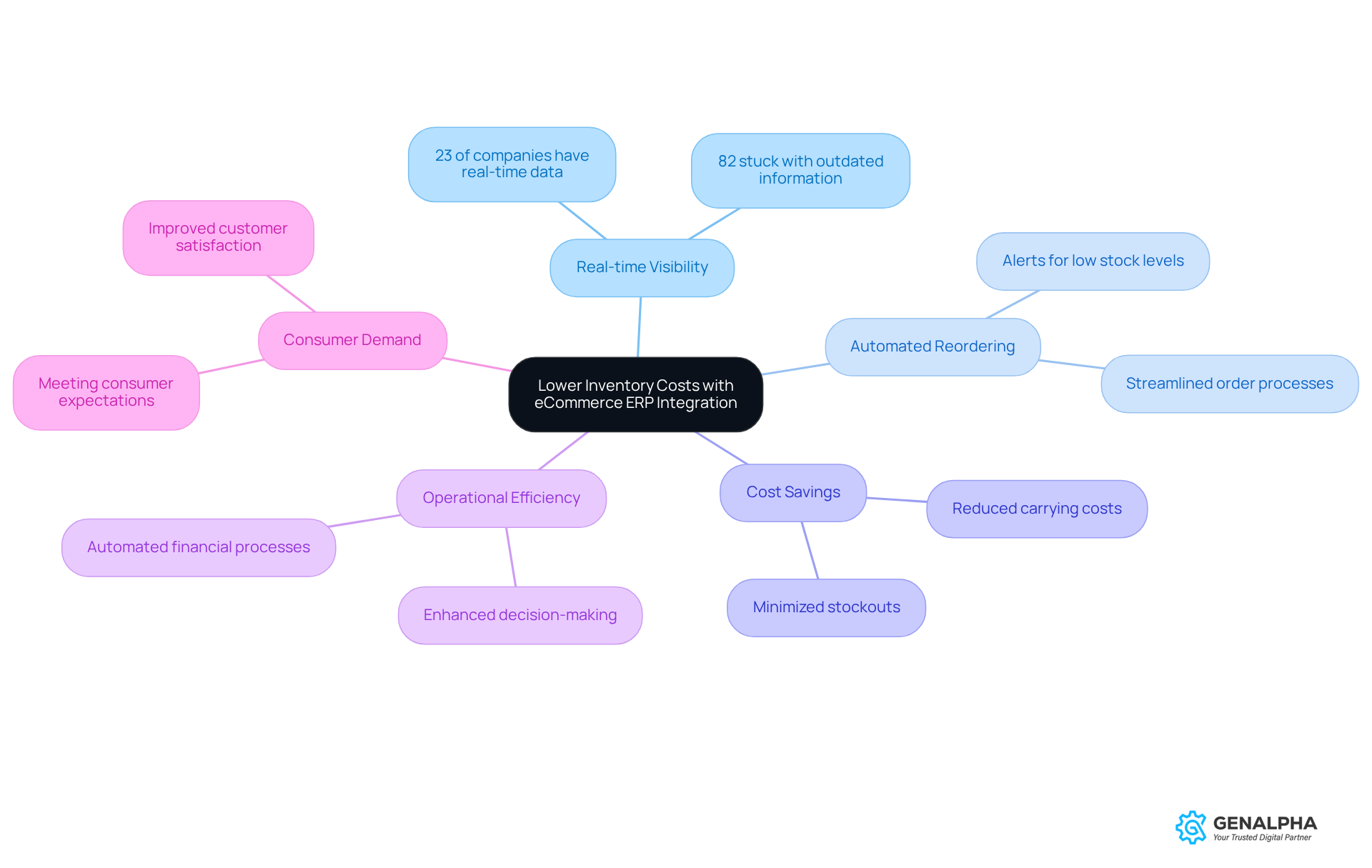
Ensure Data Consistency: Maintain Reliable Operations with eCommerce ERP Integration
Have you ever thought about how data consistency can really change the game for eCommerce? Integrating ERP systems provides a huge advantage in the context of e commerce erp integration. By centralizing data across different platforms, companies can make sure that every department is on the same page with accurate information. This unified approach helps reduce errors and miscommunication, which in turn leads to and more reliable operations.
Experts in the field often emphasize the importance of having a single source of truth (SSOT). It’s all about consolidating information and cutting out duplication. This not only makes processes smoother but also allows businesses to make quick, informed decisions based on real-time insights. For example, many companies that have successfully implemented e commerce erp integration between their ERP systems and eCommerce platforms have reported significant boosts in both efficiency and data accuracy. In fact, statistics show that 95% of businesses experience major improvements after implementing these systems. That’s a testament to the transformative power of e commerce erp integration!
By harnessing centralized data, businesses can be more responsive to market changes, optimize how they allocate resources, and ultimately fuel growth in a competitive landscape. As one expert puts it, "ERP software optimizes business performance, but only when the system is implemented and used effectively." So, are you ready to explore how ERP integration could benefit your business?
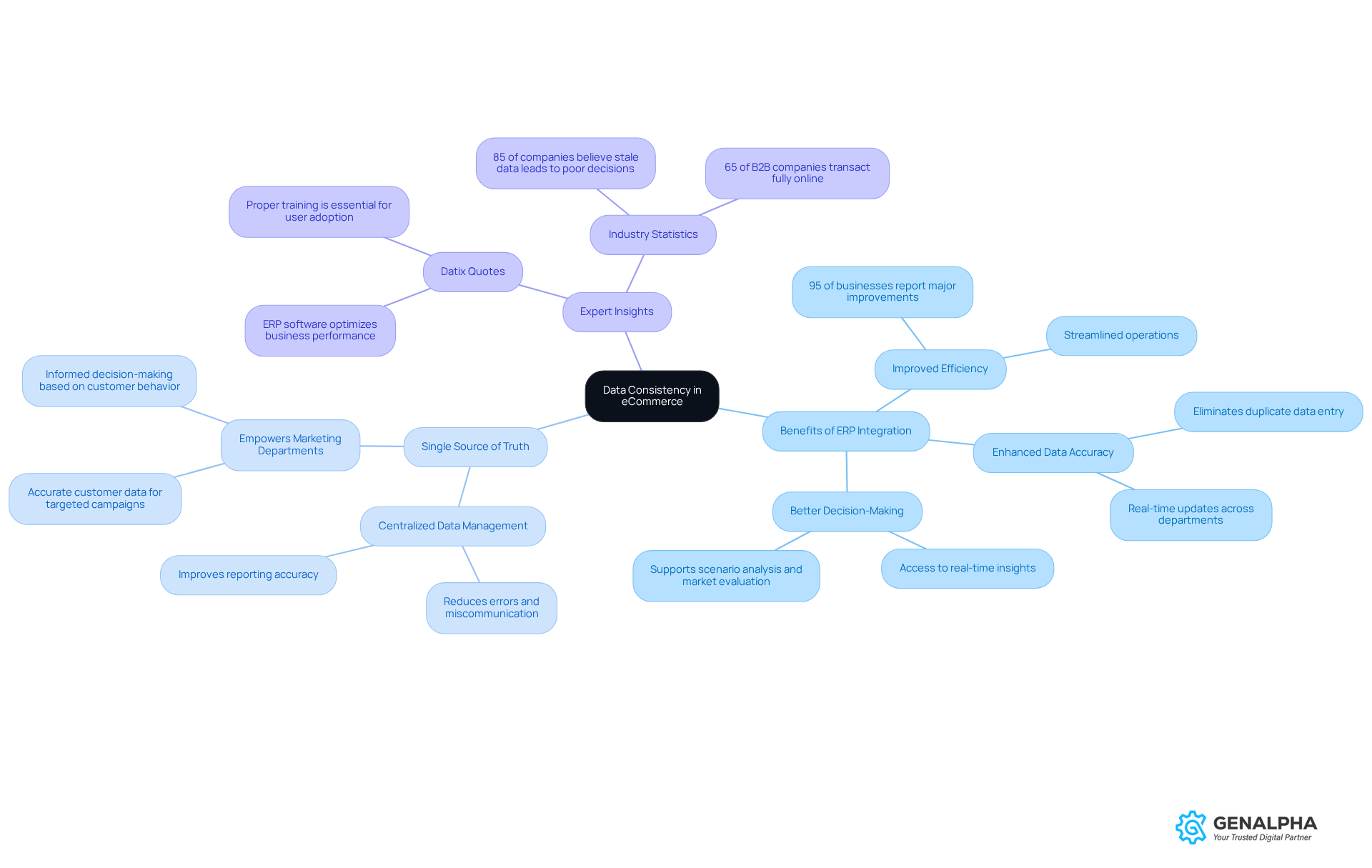
Eliminate Data Silos: Foster Collaboration with eCommerce ERP Integration
The e commerce erp integration is super important for breaking down those pesky data silos that often get in the way of collaboration between departments. Imagine a unified platform where everyone can easily access data—this means teams can share insights and make informed decisions together! Not only does this collaborative approach boost operational efficiency, but it also makes us way more responsive to what customers need.
Did you know that 66% of organizations believe their ERP systems have made their operations more efficient? Lisa Schwarz, a Senior Director of Global Product Marketing, shared this insight, and it really highlights the impact of these systems. Take ThaiNamthip Corporation, for example. They in less than seven days thanks to integrated solutions, showing just how beneficial collaboration can be.
As Kevin Peake points out, effective communication and collaboration are key to driving innovation and hitting our business goals in today's competitive landscape. So, how can we make the most of e commerce erp integration? Let’s focus on:
- Creating clear communication channels
- Leveraging data analytics for smarter decision-making
- Continuously training our teams to adapt to these unified systems
What steps will you take to foster this collaboration?
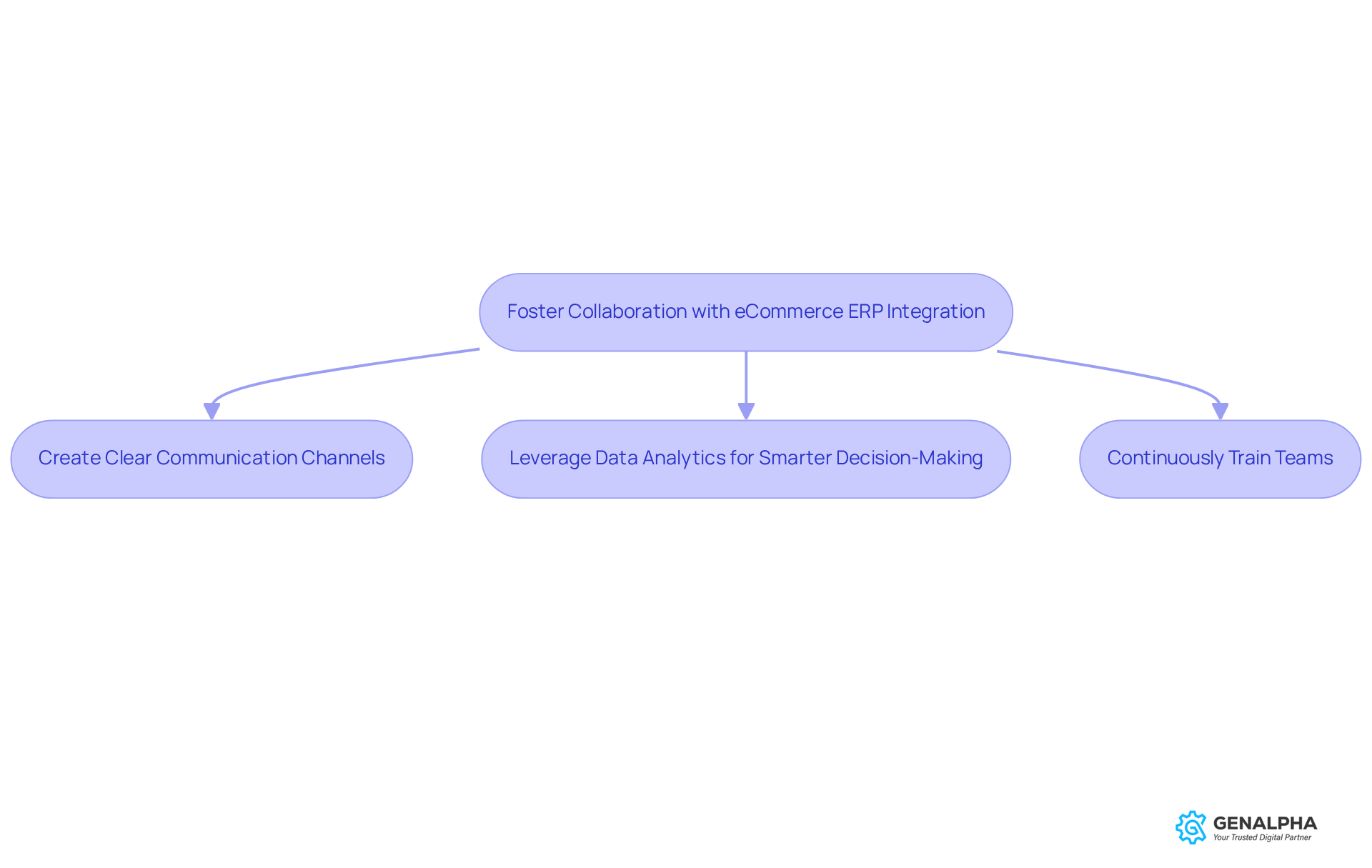
Sync Online and Brick-and-Mortar Operations: Enhance Sales Channels with eCommerce ERP Integration
For manufacturers who are juggling both online and physical stores, e commerce erp integration is key to achieving smooth synchronization across sales channels. Imagine this: your inventory levels, pricing, and client data all align perfectly, creating the unified shopping experience that shoppers really look forward to. Industry leaders emphasize that keeping this consistency not only boosts customer satisfaction but also opens up more sales opportunities.
By leveraging technology to streamline operations, producers can enhance their sales avenues. Think about it—every client interaction, whether online or in-store, reflects the same quality and reliability. This approach builds trust and encourages . After all, customers truly appreciate a seamless experience across all platforms. So, how are you ensuring that your sales channels are in sync?
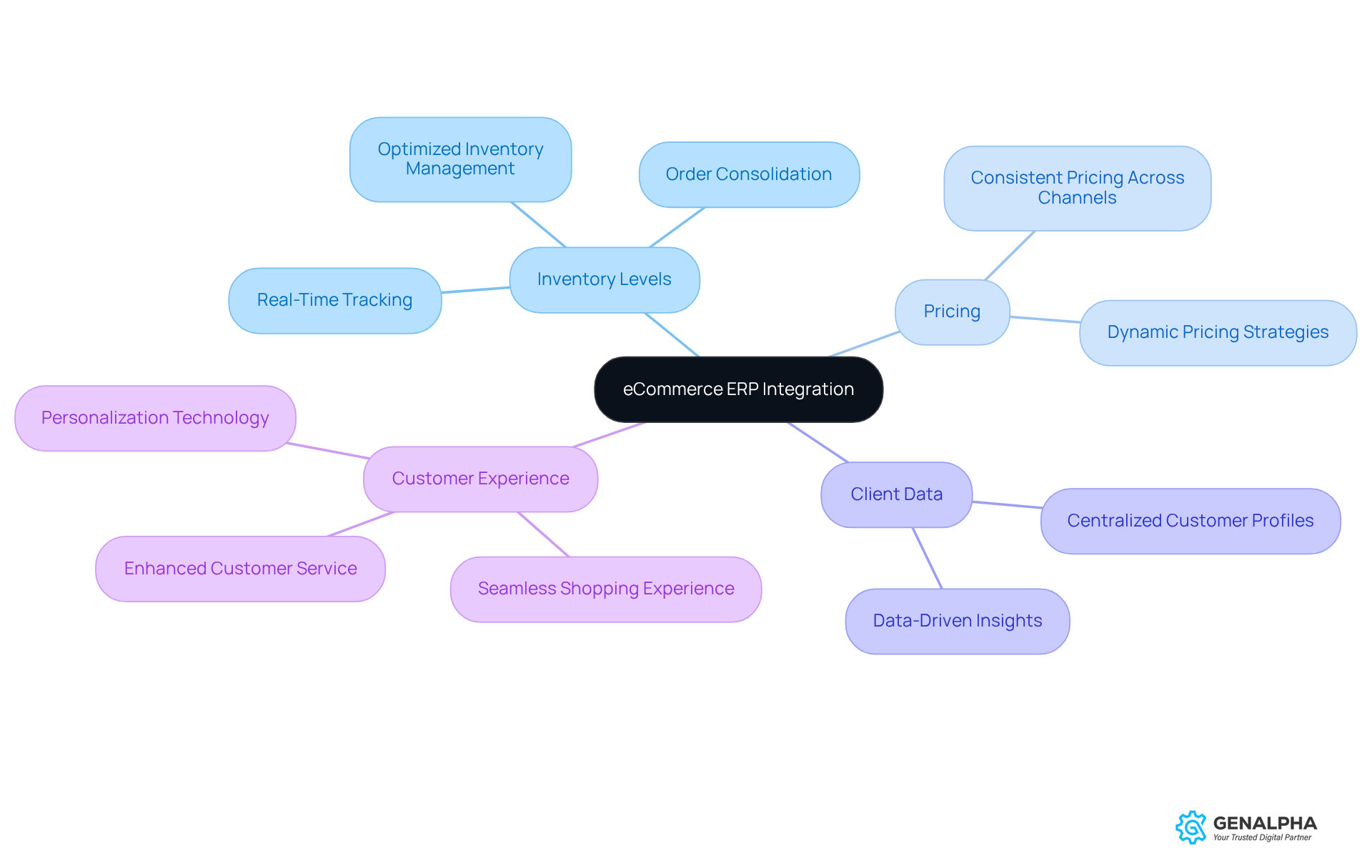
Easier Scalability: Support Growth with eCommerce ERP Integration
Have you ever considered how e commerce erp integration can significantly assist producers in their growth? It’s all about scalability—something that’s essential for sustained growth. As businesses expand, these integrated systems can effortlessly manage increased transaction volumes and add new product lines without needing major changes to existing processes. This seamless scalability not only boosts but also helps producers navigate the complexities that come with growth.
For instance, did you know that 70% of organizations have reported a better client experience thanks to ERP systems? This improvement directly links to their ability to handle higher transaction volumes effectively. And let’s not forget about the global wholesale market, which was valued at nearly $49.5 trillion in 2023 and is projected to skyrocket to $68,092.65 billion by 2028. This really highlights how critical integrated systems are for growth in competitive sectors.
By leveraging e commerce erp integration, producers can remain agile and responsive to market needs, which ultimately boosts profitability and client satisfaction. So, how can you get started? Take a moment to evaluate your existing systems and pinpoint where connections can simplify operations and enhance client interactions. It’s time to make those connections work for you!
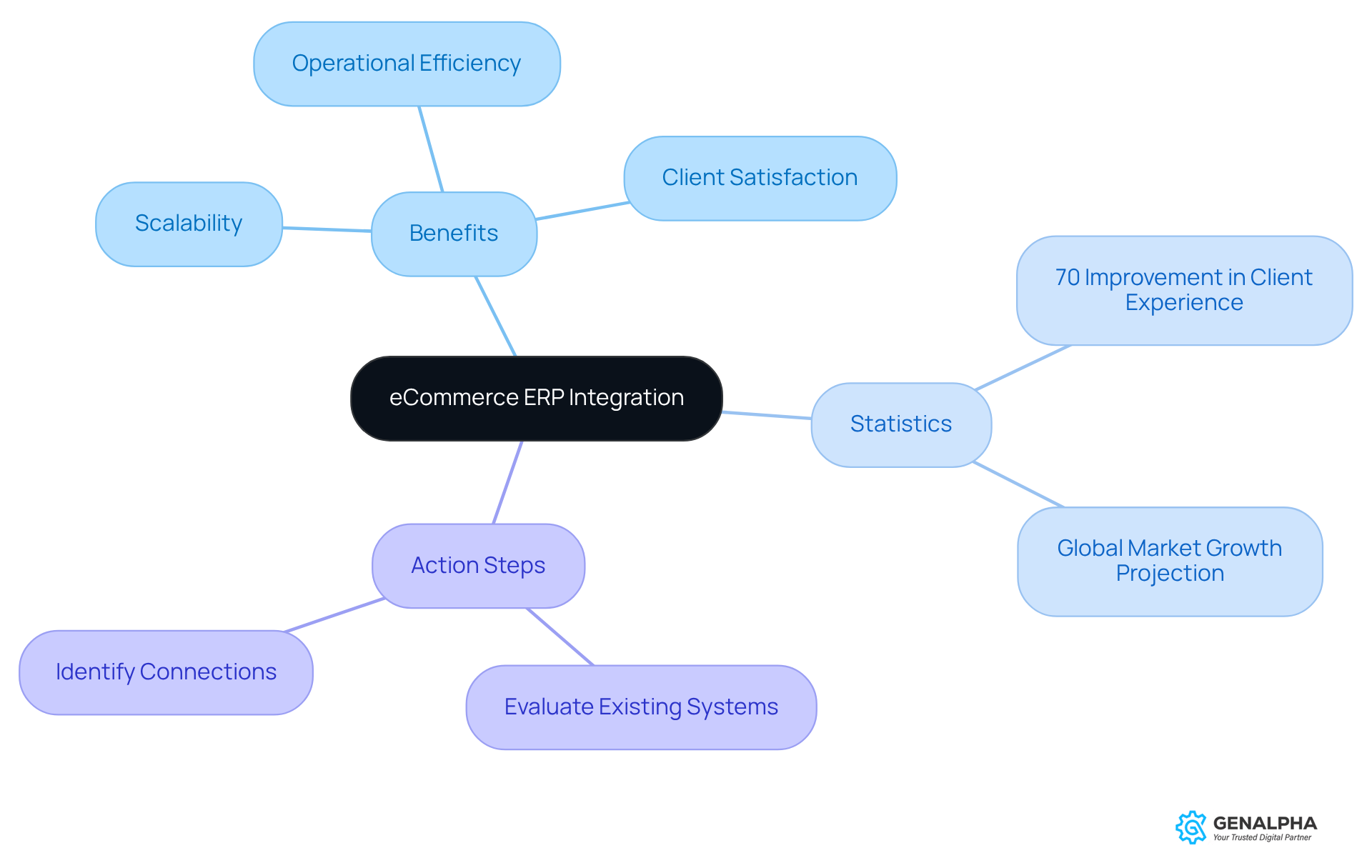
Enhance Customer Experience: Drive Satisfaction with eCommerce ERP Integration
Imagine walking into a store where everything just clicks. That’s what e commerce erp integration brings to the table! They significantly enhance your experience by offering precise, real-time information and streamlining purchasing procedures. When producers embrace these connections, they often see and accurate stock levels—leading to happier customers.
For instance, a study shows that companies labeled as 'front runners' in digital commerce enjoy:
- 62% more spending from clients who have great purchasing experiences
- A whopping 70% retention rate
That’s impressive, right? On the flip side, lacking effective digital tools can lead to an average sales drop of around 13%. This really underscores how crucial it is to have everything working in harmony.
By putting client experience front and center through e commerce erp integration, producers can build lasting relationships and encourage repeat business. As Blake Morgan wisely states, "Unhappy clients cost more to serve because they require more time and resources to build goodwill." This really highlights the financial stakes tied to client satisfaction.
So, how well do you understand your customers’ needs? Simplifying purchasing processes is key to winning B2B clients, fostering loyalty, and positioning manufacturers for sustained growth in today’s competitive market. Let’s make those connections work for you!
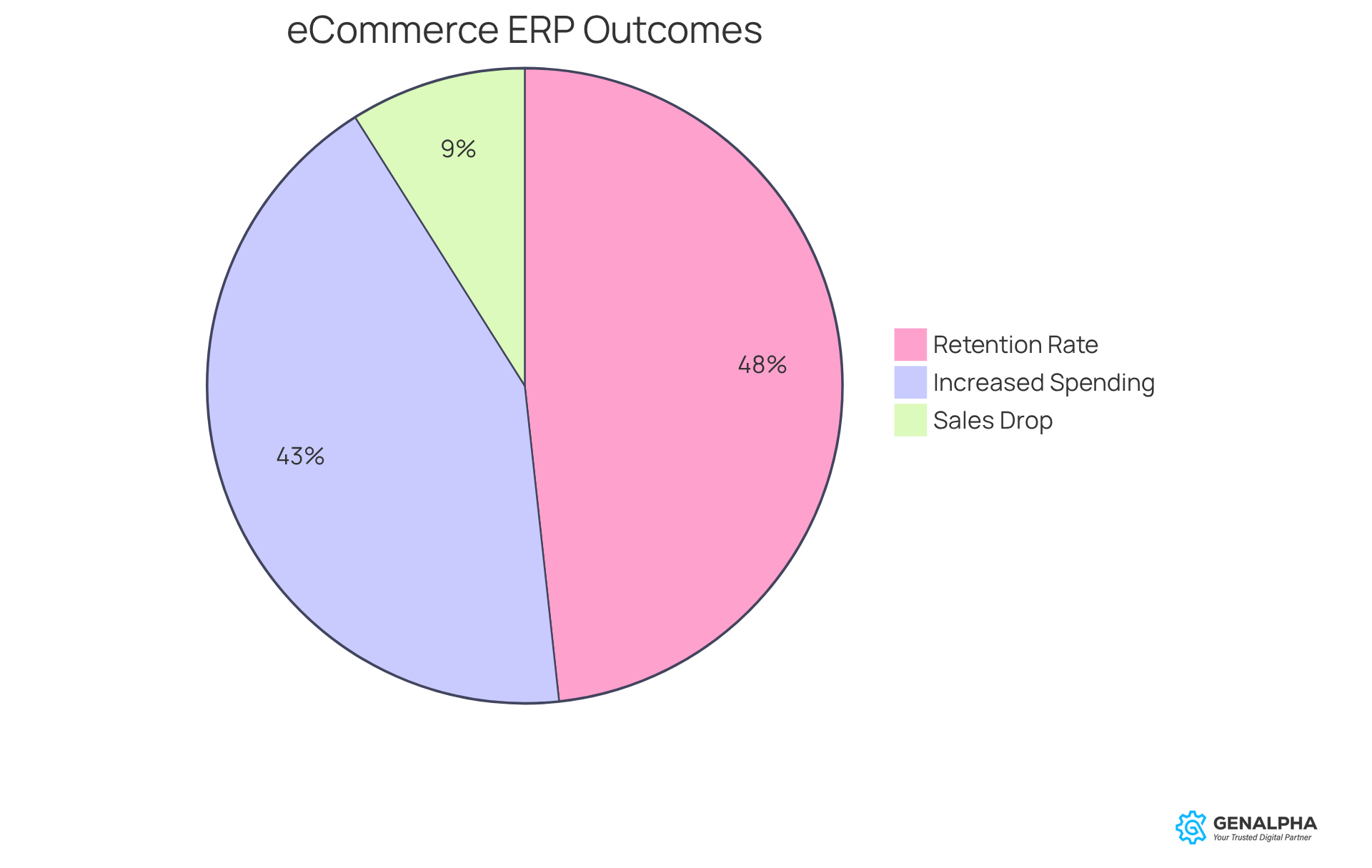
Conclusion
Integrating eCommerce and ERP systems offers a game-changing opportunity for manufacturers. It’s all about streamlining operations, cutting costs, and boosting customer satisfaction. With advanced solutions like Equip360, businesses can automate processes, ensure data accuracy, and enhance collaboration across departments. This integration doesn’t just support operational efficiency; it also helps manufacturers respond quickly to market demands and stay ahead of the competition.
Let’s think about some key benefits of eCommerce ERP integration. We’re talking about:
- Lower operating costs
- Fewer human errors
- Improved fulfillment times
- Smarter inventory management
When you maintain data consistency and break down silos, decision-making becomes easier and more reliable. Just look at various case studies—manufacturers embracing these systems often see significant boosts in productivity and customer loyalty.
So, why is eCommerce ERP integration so crucial? It empowers manufacturers to tackle the complexities of growth while providing exceptional customer experiences. As the market keeps evolving, prioritizing these integrations is key for businesses wanting to thrive in a competitive landscape. The time to act is now! Let’s evaluate our current systems and see how eCommerce ERP integration can unlock new levels of efficiency and success for your organization.
Frequently Asked Questions
What is GenAlpha Technologies known for?
GenAlpha Technologies specializes in delivering customized eCommerce ERP integration solutions that seamlessly fit with ERP systems, exemplified by their flagship product, Equip360.
How does Equip360 help producers?
Equip360 helps producers streamline operations, optimize inventory control, and boost overall sales performance by automating processes and reducing manual errors, ensuring access to real-time data across departments.
What are the benefits of having real-time data for producers?
Real-time data allows producers to respond quickly to market needs, enhance client satisfaction, and maintain a competitive edge in their industry.
What statistic highlights the importance of ERP data?
According to Lisa Schwarz, Senior Director of Global Product Marketing, "71% of businesses believe that decisions are delayed if ERP data is unavailable," emphasizing the critical role of ERP data in improving efficiency.
How can eCommerce ERP integration reduce operating costs?
eCommerce ERP integration can lead to significant reductions in operating costs by automating routine tasks and minimizing manual data entry, which saves on labor costs and reduces costly mistakes.
What is the impact of automated reconciliation processes?
Businesses that adopt automated reconciliation processes can reduce their reconciliation time by up to 70%, leading to faster financial operations and better cash flow management.
What average cost decrease do producers report from ERP integration?
Producers utilizing ERP integration report an average cost decrease of 40% in IT expenses due to streamlined operations and reduced manual workload.
What percentage of companies see better supplier interactions due to ERP integration?
A significant 76.2% of companies integrating ERP systems report better interactions with suppliers and increased productivity.
What challenges come with eCommerce ERP integration?
Challenges associated with eCommerce ERP integration include data migration issues and the need for effective change management.
How does eCommerce ERP integration reduce human error?
eCommerce ERP integration reduces human error by automating data entry and keeping information synchronized across platforms, ensuring order details, inventory levels, and customer information are accurate and up-to-date.
What is the effect of ERP systems on cycle time?
Businesses using ERP systems experience a 35% reduction in cycle time, which boosts order accuracy and operational efficiency.
What percentage of high-volume transactions can advanced reconciliation software match instantly?
Advanced reconciliation software can match up to 70% of high-volume transactions instantly, resulting in fewer mistakes and smoother operations.
How does eCommerce ERP integration enhance data accuracy?
eCommerce ERP integration enhances data accuracy by providing real-time updates, which are essential for reliable inventory and order management.
Why is ERP integration particularly important in manufacturing?
The significance of ERP integration in manufacturing is underscored by the fact that 47% of ERP users are in this field, highlighting its critical role in enhancing operational efficiency.




